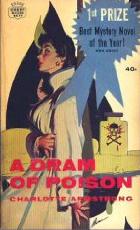Wednesday, October 1: Tune It Or Die!
A VINTAGE DRAM
by Rob Lopresti
When I was a freshman in college I took an introduction to philosophy course entitled Freedom and Individuality. We read, as I recall some Plato, Nietzsche, B. F. Skinner, and a bunch of others. All heady stuff, but it was the last book that threw me for a loop. A cheap paperback, the cover showed a woman in a long gown running away from a mysterious looking house with one lit window.
“A gothic novel?” I said in amazement. “You want us to read a gothic?”
As I recall Professor Janet Lewis got red. “Forget the cover!” she snapped. “Just read the damned book!”
I did. It was great.
Have a little drink
 The novel was A Dram Of Poison, by Charlotte Armstrong, and it won the Edgar for Best Novel in 1958. (An aside: occasionally the Mystery Writers of America thinks outside the box and gets one so right it makes me proud to be a member. Like this award, and the Edgar to Jorge Luis Borges for short stories, and the Best Motion Picture award to Z. But I digress.)
The novel was A Dram Of Poison, by Charlotte Armstrong, and it won the Edgar for Best Novel in 1958. (An aside: occasionally the Mystery Writers of America thinks outside the box and gets one so right it makes me proud to be a member. Like this award, and the Edgar to Jorge Luis Borges for short stories, and the Best Motion Picture award to Z. But I digress.)
It is hard to categorize this book so I can’t be too hard on the designer of the book cover. (And the cover for the original hardcover … phew, what a stinker.) Is it a suspense novel? I guess. A crime novel? Well yes, but there’s only one crime and it’s committed by the good guy.
The first part of the book is about the growth of a relationship between a man and a woman. The second part is a slowly building suspense story. The last half of the book is … well, how can I describe it? It’s a sort of debate on free will conducted by strangers as they travel around a city at breakneck speed trying to prevent a needless tragedy.
A plot of poison
I’m trying not to give away too much of the story here … Ken Gibson is a nice fellow, but not a very worldly one. A lifelong bachelor at age 55, he teaches poetry at a college. One day he attends the funeral of a former colleague who had been sunk for many years in a vicious, miserable senility. There he meets the deceased’s daughter Rosemary, who has spent her entire adult life caring for the nasty old man. Now she is in her thirties and has no income, no skills, and no support system.
Ken wants to help her, but this being the 1950s and a conservative college town, he feels he can only take her in if they marry. A platonic marriage, he promises, with separate bedrooms, and she reluctantly agrees.
Slowly Rosemary’s fragile mental and phsycial health improves. Slowly their relationship deepens. And then there is an accident and Ken is badly injured.
His sister Ethel arrives to help take care of him and Ethel is a very different kettle of fish. A successful businesswoman in an era of homemakers, she is tough, worldly, and has strong opinions on everything. She is also a big fan of Freud and the idea that because of the subconscious mind there are no accidents.
So, who was responsible for Ken’s injury? How about his beautiful, much younger wife, who is healthy now and perhaps doesn’t need him anymore?
Ethel’s logic leads Ken down a road to despair and a desperate choice that might have tragic results. There is one person who might be able to prevent the bad outcome. It turns out he can’t help, but he knows of one other … and so a chain of helpful strangers develops. Each of them moves the plot forward, while taking part in destroying Ethel’s (unintentionally) cruel web of logic and inference.
 My favorite line in the book is one I have used a number of times over the years. Paraphrasing here … Someone talks about the idea of Doom: an atomic bomb is certain to fall some day because human beings never change. Another character replies that if people don’t change you should be able to explain the ASPCA to a caveman.
My favorite line in the book is one I have used a number of times over the years. Paraphrasing here … Someone talks about the idea of Doom: an atomic bomb is certain to fall some day because human beings never change. Another character replies that if people don’t change you should be able to explain the ASPCA to a caveman.
The Armstrong Ouevre
I’ve read a few more of Charlotte Armstrong’s books, and never been particularly impressed by them. The ones I have come across read as standard women-in-jeopardy tales. But A Dram of Poison holds a special place in my heart. And thank you, Professor Lewis, for making us read the book.
It is a wonderful, uplifting, life-affirming suspense novel. And how often do you hear that phrase?





















I say here, displaying my foolishness, that I’ve never read Armstrong. Thanks for the reccomendation!